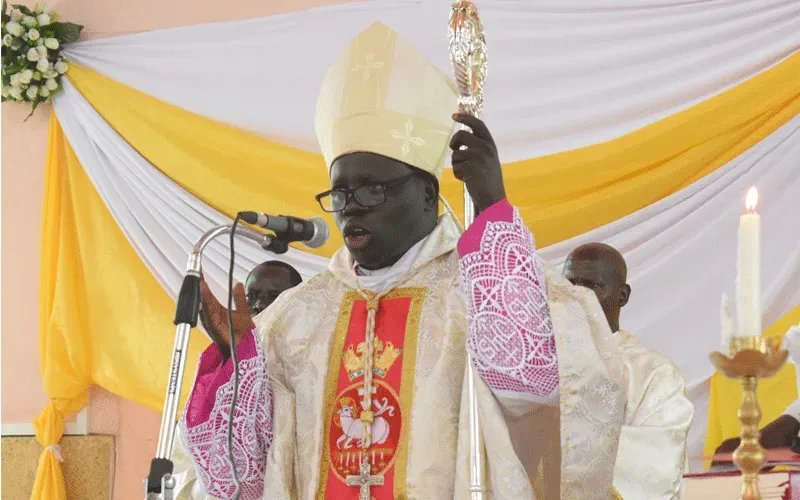
Catholic Church leaders in South Sudan are engaging citizens of the East-Central African country to seek divine intervention for the realization of “long-lasting peace and stability” in their sister country, Sudan, where war broke out on April 15.
Speaking during the launch of the Child and Vulnerable People Protection Policy in South Sudan’s capital city, Juba, Archbishop Stephen Ameyu Martin appealed for prayers for the members of the Clergy ministering in Sudan amid violence.
“As a Church, we are urging the citizens in South Sudan to pray for peace in (our) sister country Sudan so that long-lasting peace and stability can prevail for the people of God there,” Archbishop Ameyu of Juba Diocese said during the Thursday, May 4 event that was held at Good Shepherd Peace Center Kit in the outskirts of Juba.
The Local Ordinary of Juba Archdiocese who doubles as the Deputy President of the Sudan Catholic Bishops’ Conference (SCBC) that brings together Catholic Bishops in Sudan and South Sudan added, “Let us pray for our Priests; and let us pray for the protection of all our people in Sudan.”
“South Sudanese should not forget their Sudanese brothers and sisters in times of need and difficulties,” the South Sudanese Catholic Archbishop emphasized, and underscored the need to “maintain peace in South Sudan as we continue to put our brothers and sisters in Sudan in prayers.”
Since April 15, the Rapid Support Forces (RSF), the paramilitary force under General Mohamed Hamdan Dagalo, has been in battle with army units of the Sudanese Armed Forces (SAF) that are loyal to the head of Sudan's transitional governing Sovereign Council, General Abdel Fattah al-Burhan, who led the coup against the transitional government in October 2021.
Fighting has reportedly continued in Sudan’s capital, Khartoum, despite the seven-day ceasefire that was to begin on May 4.
In an interview with ACI Africa, the Parish Priest of St. Joseph Kalakla Parish of the Catholic Archdiocese of Khartoum that is located some 15 km South of the Sudan’s capital, Khartoum, highlighted some of the challenges resulting from the fighting.
“Thousands of people are suffering to cross borders or to fly to their countries. For some families from our parish, they are stuck in Rink, waiting for flight to Juba more than a week now,” Fr. Zobinou Komlan Hubert said in the May 3 interview.
The member of the Salesians of Don Bosco (SDB) added, “The issue of food and water and electricity is the biggest problem for the people who left and are waiting somewhere and for us who remained in Khartoum. We don't know how it will be if they continue fighting.”
Another Khartoum-based SDB member has confirmed the bombing of various Catholic facilities in Sudan, including the April 20 rocket attack on a Catholic Cathedral.
“Just as the two bombs that fell in the compound of the Cathedral in El Obeid… another fell near the northern end of St. Joseph Vocational Training Centre, destroying partly the meeting-hall of the students,” Fr. Jacob Thelekkadan said in his May 5 statement he sent to ACI Africa, making reference to the Salesian training facility he oversees.
It is “a three-week-old conflict that has killed hundreds and triggered an exodus”, Reuters reported Sunday, May 7.
In his May 4 address at the Good Shepherd Peace Center in Kit, Archbishop Ameyu lamented, “The destruction in Sudan has reached a wild level where most infrastructural developments including places of worship have been destroyed.”
“I received a text message from a Priest in Khartoum that the headquarters of the Comboni Fathers was bombed,” he said, and added, “The war in Sudan has affected many people in Sudan and South Sudan who now need the church leaders to work hard for peace to prevail.”
The United Nations High Commissioner for Refugees (UNHCR) has reportedly warned that if fighting continues in Sudan, over 815,000 people are likely to flee the country, “including 580,000 Sudanese refugees and 235,000 refugees from neighbouring countries such as South Sudan, Ethiopia and Chad, who had settled in Sudan to find safety but are now caught up in a conflict in their host country.”
